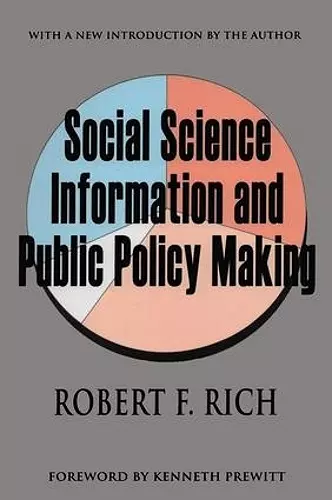Social Science Information and Public Policy Making
Format:Paperback
Publisher:Taylor & Francis Inc
Published:30th Sep '01
Currently unavailable, and unfortunately no date known when it will be back
This paperback is available in another edition too:
- Hardback£91.99(9781138532960)

A survey of federal officials reveals the belief that government should make the fullest possible use of social science information-and yet most of the information developed by social scientists winds up in specialized libraries or data banks, where it remains unused. Why don't public officials make greater use of the information social scientists develop? What can social scientists do to ensure that their findings are used? To answer these and related questions, Robert Rich reports the results of a unique experiment designed to facilitate the use of research data by public officials in federal agencies.
Rich interviewed both researchers and users of research data over the two-year life of a Continous National Survey (CNS) experiment to discover the extent to which the CNS mechanism was successful and to record the levels and types of use that officials made of the data provided. Rich reveals that factors such as the timeliness, cost, and relevance of data do not guarantee that information will be used. He examines patterns in the actual use of survey data by agency officials and explores key organizational factors, such as the compatibility of information with various bureaucratic interests. He discusses the preoccupation of public officials with bureaucratic issues regarding the ownership and control of information, identifies the incentives that prompt bureaucrats to pass along new information and the government officials' difficulties in developing policies and programs for meeting national needs.
Rich notes that studies of knowledge inquiry systems, found in the research literature of many social science disciplines have been dominated by a "rationalistic bias." This "bias" is expressed in terms of the belief that the act of acquiring information will automatically lead to its use, in turn, automatically leading to improved policy or decisions. He contends that empirical studies of how information is actually used do not support the assumptions of rational choice theory. The new chapter also discusses types of information, knowledge, and use; prospects for the development of learning organizations in government; and the politics of expertise. This book will be of interest to social scientists and public policy makers.
Robert F. Rich is professor of law and political science at the University of Illinois at Urbana-Champaign. He is also professor in the...
ISBN: 9780765807588
Dimensions: unknown
Weight: 362g
258 pages